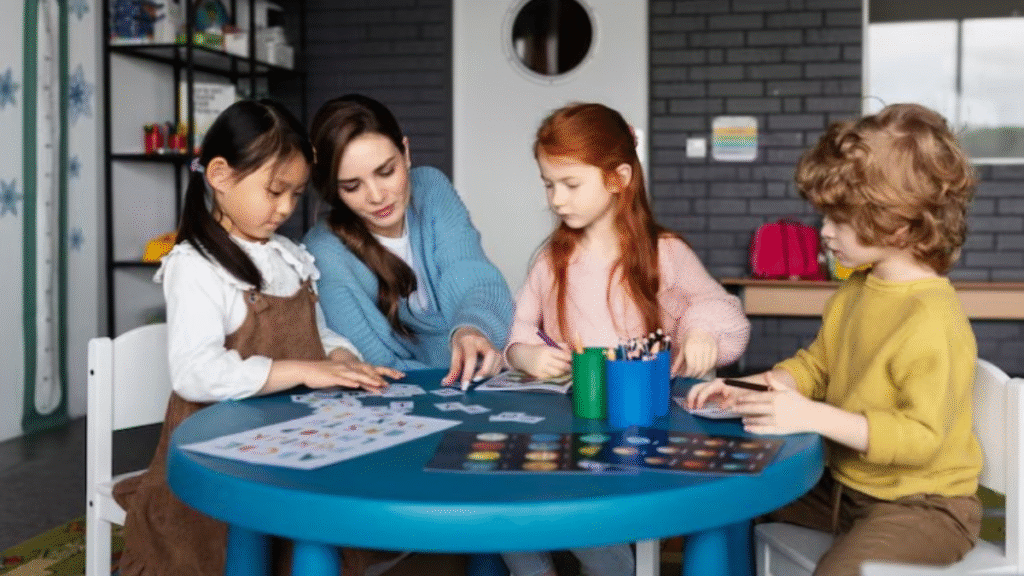For children, playtime is more than just fun and games—it’s a critical part of their development. Through play, kids learn to navigate the world, understand complex emotions, and build the social skills they’ll carry with them for life. Every shared toy, every make-believe story, and every team game is a lesson in cooperation, empathy, and communication.
Many parents and caregivers recognize the importance of social interaction but might wonder how to best support their child’s growth in this area. The good news is that fostering social skills doesn’t require elaborate plans or expensive tools. It can be as simple as engaging in purposeful, play-based activities that are both enjoyable and educational.
This guide explores the powerful connection between play and social learning. We will highlight ten specific activities designed to help children practice and strengthen vital social skills like sharing, taking turns, and understanding others’ perspectives. These games and exercises can be adapted for different ages and abilities, making them a great resource for any family.
Why Play is Essential for Social Development
Play is a child’s first classroom for social interaction. It provides a safe and natural environment to experiment with social rules, understand consequences, and develop emotional intelligence. When children play together, they are constantly practicing a range of social behaviors.
Key social skills developed through play include:
- Cooperation: Working together towards a common goal, like building a tower or finishing a puzzle.
- Sharing and Turn-Taking: Learning to wait for their turn and share resources, which teaches patience and fairness.
- Negotiation and Conflict Resolution: Figuring out how to solve disagreements, compromise on rules, and respect different opinions.
- Empathy: Recognizing and responding to the feelings of others, like comforting a friend who is upset.
- Communication: Using both verbal and non-verbal cues to express ideas, wants, and needs.
At Kids Club ABA, we see the transformative power of play every day. Our programs are built on the principle that learning should be engaging and meaningful. By integrating play-based strategies, we help children build foundational social skills in a supportive and fun-filled setting.
10 Activities to Build Social Skills
Here are ten engaging activities you can use to help your child develop their social abilities.
1. Board Games
Simple board games like “Chutes and Ladders” or “Candyland” are excellent for teaching turn-taking, following rules, and managing disappointment. As children wait for their turn, they practice patience. When they lose a game, they learn to handle frustration gracefully—an important life skill.
2. Building Blocks or LEGOs
Collaborative building is a fantastic way to encourage teamwork. Give children a shared goal, such as “Let’s build the tallest tower we can!” or “Let’s create a house for these figures.” This activity requires them to communicate their ideas, share materials, and work together to bring their vision to life.
3. Pretend Play
Whether it’s playing “house,” “doctor,” or “restaurant,” imaginative play allows children to step into different roles and see the world from another’s perspective. This builds empathy and helps them understand social roles and expectations. For example, pretending to be a doctor caring for a patient teaches them about helping and nurturing others.
4. “Red Light, Green Light”
This classic game is perfect for practicing self-control and listening skills. Children have to listen carefully for the commands and control their impulse to run when they hear “red light.” It’s a fun, active way to build attention and rule-following abilities.
5. Puppet Shows
Creating and performing a puppet show encourages children to express themselves creatively while collaborating on a story. They have to decide on characters, a plot, and dialogue, which requires negotiation and teamwork. Plus, speaking through a puppet can sometimes make it easier for shyer children to open up.
6. Simon Says
“Simon Says” is another game that sharpens listening skills and the ability to follow directions. Children must pay close attention to whether the instruction is preceded by “Simon says.” This game teaches them to differentiate and respond to specific verbal cues, an important part of effective communication.
7. Team Sports or Group Games
Activities like soccer, relay races, or even a simple game of tag encourage children to work as a team. They learn about sportsmanship, supporting their teammates, and coordinating their actions to achieve a shared objective. These games also provide a healthy outlet for physical energy.
8. Charades for Kids
Acting out words or ideas without speaking helps children develop non-verbal communication skills. They must use body language and facial expressions to convey a message, and they learn to interpret these cues from others. It’s a fun and often hilarious way to practice expressing and understanding emotions.
9. Cooking or Baking Together
Following a recipe together is a structured activity that requires cooperation and following a sequence of steps. Each child can be responsible for a different task, like measuring flour or stirring the batter. This teaches them about responsibility and the importance of each person’s contribution to the final product.
10. Reading and Discussing Stories
Reading a book together and then talking about the characters’ feelings and choices can be a powerful tool for building empathy. Ask questions like, “How do you think that character felt when that happened?” or “What would you have done?” This helps children connect with emotions and consider different perspectives.
Making Play a Part of Everyday Learning
Integrating these activities into your child’s routine doesn’t have to be complicated. Look for natural opportunities during family time, playdates, or even on a rainy afternoon. The goal is to make social learning a consistent and enjoyable part of their life.
Remember to provide guidance and positive reinforcement. Praise your child for sharing, taking turns, or being a good sport. If a conflict arises, use it as a teaching moment to discuss feelings and find a fair solution.
At Kids Club ABA, our dedicated therapists specialize in using play-based learning to support children with diverse needs. We create individualized programs that target specific social skills in a way that feels like pure fun. By understanding that play is learning, we can unlock a child’s full potential and set them on a path to social success.







